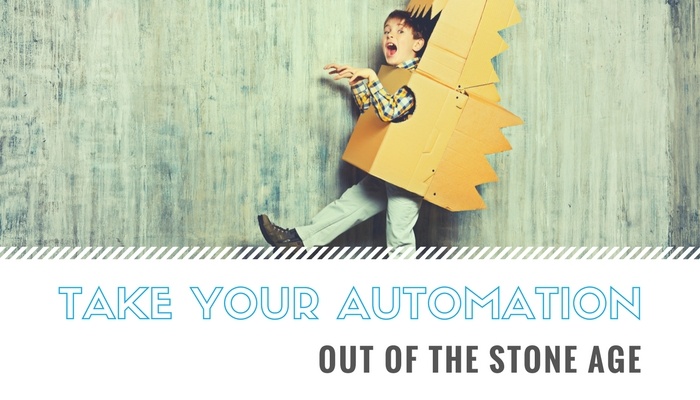- May 10, 2017
- By Emily Inman
- In Social Media and Digital Marketing, Content Marketing
The Era of AI Is Taking Marketing Automation out of the Stone Age

Marketing automation has been changing the digital landscape for the last several years, but is it for the better? When personal connections and human storytelling form the foundation of our communications, can artificial intelligence do it better?
The answer is a resounding "yes!"
Marketing that is backed by artificial intelligence and machine learning will allow you to effectively blend the art of marketing storytelling with the science of data analysis in ways that improve marketing reach and impact. Let’s take a look at three specific areas where AI and machine learning are having a major impact on the marketing and advertising landscape.
1. Discovery
As a content strategist, I can confidently say that researching topic and campaign ideas takes time and organization. From brainstorming ideas to scoping out the competition to analyzing the results of past campaigns, just thinking about what to do next consumes almost as much time and energy as doing it.
Any tool that allows marketers to speed up the process can be a boon, but you can’t go with any old tool.
AI-backed tools take a systematic approach that considers everything all at once for more comprehensive results. By using data to discover relevant topics and options, provide detailed reporting on the performance of original content, and adding curation and distribution processes for third-party content, you need only be there to keep the wheels turning and generate original content when necessary.
A simple discovery tool like Buzzsumo will help you identify what types of content, which topics, and which key influencers are currently dominating any market. It's like a "trending topics" list on steroids and beats any brainstorming session by a landslide.
2. Optimization
Understanding what types of content and which topics to cover are one thing. Actually creating that content and covering the topics in depth in the right way are something else entirely. Keeping track of what you've covered and whether you've covered the subject effectively is yet another task to add to the list. To top it all off, you must meet Google’s demand for quality content and corresponding declining reliance on keywords as indicators of a document's relevancy.
Figuring all this out can be an entire job unto itself.
Today's content marketers have to work hard to create the relevant, helpful content that gets results. Machine learning technology streamlines the process, allowing you to discover relevant topics, fill in the gaps in your coverage of the topic and make sure you use the right words and phrases in your content.
The important bit here is the use of semantics—understanding the meaning behind the words. What are people trying to say with their words? What's the bigger story that emerges with a comprehensive piece of writing? Up until fairly recently, computers couldn't get that deep into human language. Now, however, all this meaning suddenly has meaning—making an analytics tool that's backed by AI and machine learning not only possible, but highly successful.
3. Personalization
Today's consumers know that companies are collecting a certain amount of personal data—especially when they interact with websites and other digital content. But most consumers want something in return for turning over this information: a personalized experience that goes beyond simply slipping their first name in at opportune moments.
Artificial intelligence is your ticket to offering a personalized experience that is tailored to each individual user in a meaningful way. For example, if a consumer has had repeated interactions with your website, you can present content that is relevant to her previous activity rather than giving all website visitors the same information.
Artificial intelligence can also track a user's shopping and buying habits to provide offers and incentives that make sense for that user. We already see this in action in the form of remarketing and retargeting, but the possibilities for personalized advertising are growing. From email drip campaigns to suggested products to shopping cart deals, smart automation is providing marketers with an easy way to provide customized experiences that work.
Connecting with Intelligence
AI can be pushed too far, becoming too human to the point that people feel uneasy or even repulsed. While, most of the time, the term “uncanny valley” is used for robots with eerie human features, plenty of people can feel like they are being stalked online when ads and content seem to follow them around wherever they go. Marketers must always make sure that the quest for targeted advertising is balanced with an understanding of what consumers can and will tolerate from automation.
On the other hand, uncanny valley isn’t necessarily a fixed feeling. As people become more accustomed to having technology in their lives, they become less averse to interacting with artificial intelligence. We've now reached a point where more and more consumers are becoming used to the help provided by Siri, Alexa, and other AI personalities every day. People are happy to say "OK, Google" at their smartphone and ask their vehicles for directions and dinner recommendations.
For marketers, this also means a building trust for interacting with small-scale virtual assistants and chatbots—another great way for companies to deploy AI in a way that will boost the bottom line. Most people know that they aren't interacting directly with a human, but are still happy to ask the bot questions and get information faster than a traditional search and without the commitment of a phone call. As the tolerance for AI grows, the uncanny valley shrinks and companies will be able to implement even more AI solutions—as long as there's still humans around for the traditionalists to interact with.
Embracing Artificial Intelligence
All doomsday scenarios aside, many people tend to scoff at the idea of using artificial intelligence to inform something as human as marketing and advertising. Only people can truly know what people want, right? But the truth is that smart marketers are not replacing their humans with AI, they are using AI to enhance marketing activities while keeping the humans in the driver's seat.
AI can help marketers create better content, target people more effectively, understand topical relevance on a much deeper level, and generate useful and relevant content much faster and more effectively. When used right, AI can inform your strategists and creative teams to ensure consistency and effectiveness while keeping people at the gates to make sure the human element can still be found.





